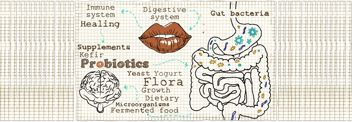Eat Your Brain
- Home
- Blog

Is it possible that what you think and feel is determined by what you eat? Sound impossible? Let’s find out. There is increasing scientific evidence that the food we eat, and how efficiently we digest it have a sizeable impact on our mental health. The connection between physical health and food is familiar to most everyone. But what is the link between food, cognition, and emotional states? It is becoming increasingly clear that what you eat directly affects the structure and function of your brain and, ultimately, your mood.[i] [ii]Food is the fuel that powers your brain. And your brain requires more energy production than any other human organ – needing to produce and consume up to 20 percent of the body’s entire energy production![iii] Nutritional Psychiatry, Nutritional Neuroscience, and Nutritional Psychology are emerging scientific fields that establish the connection between healthy nutrition, optimal digestion, and improved mood and cognitive functioning. Let’s explore some recent findings.
Nutritional Psychiatry:
The emerging field of nutritional psychiatry is establishing many connections between one’s diet, mood, behavior, digestive processes, and gut bacteria. (See my previous blog, Psychobiotics and the Microbiome: It’s a Gut Feeling.) Depression and bipolar disorder have traditionally been thought of as dysfunction in neurotransmitters such as serotonin or dopamine. This is only a small part of the story. Scientists have recently determined that the bacteria in our gut and the food we eat both play a significant role in regulating the neurotransmitters in our brain. For example, poor appetite, skipping meals, and a dominant desire for sweet foods can precede and accompany clinical depression.[iv]
Nutritional supplements and dietary improvements are increasingly recommended to improve or stabilize a mood disorder. For example, omega-3 fatty acid supplements are sometimes used as an adjunctive treatment for bipolar depression.[v]
Nutritional Neuroscience
Nutritional neuroscience is an emerging discipline that researches how nutritional factors are intertwined with human cognition, behavior, and emotions.[vi] Many aspects of nutrition – from food groups to specific nutrients – affect brain structure and function, and therefore have profound implications for understanding the nature of psychological health, aging, and disease. This research offers the promise of using nutritional interventions to prevent the onset or delay the progression of neurodegenerative diseases such as Alzheimer’s and Parkinson’s, that are becoming more prevalent as our population ages.[vii]
Nutritional Psychology
Nutritional Psychology studies the bidirectional nature of the effects of nutrients on mood and behavior, and vice versa. This field examines the relationship between food and our internal experience of ourselves. For instance, stress lowers our body’s ability to fight off disease, and depression can create musculoskeletal aches and pains as well as digestive disease. Other effects of stress on the digestive system include:
- Driving us to eat more
- Increasing blood levels of cortisol and insulin which signal weight gain and fat storage
- Decreasing muscle growth
- Indigestion
- Nutrient depletion
- Killing off healthy gut bacteria
- Increase in unhealthy cholesterol levels
- Lower thyroid and growth hormone levels
- Increased susceptibility to food allergies
Nutritional Psychology furthers the study of the links between our mind and our body including how our thoughts and feelings impact the foods we choose to eat, and how we digest, assimilate, and metabolize those choices.
If You Feel What You Eat, What Comes Next?
The field of Nutritional Psychiatry is still in its infancy. Is it ready for prime time – able to guide public policy and clinical practice?[viii] Authors of an article in Lancet Psychiatry argued that the time is now to recognize the importance of nutrition and nutrient supplementation in psychiatry. They believe that nutritional medicine should be considered a mainstream element of psychiatric practice, with research, education, policy, and health promotion supporting this new framework.”[ix] Given the clear and compelling relationship between what you eat and your state of mind, why wait for the field of psychiatry to catch up? Begin to “eat your brain” to health starting today, by instituting a brain-healthy diet.
Karen Reed at Positive Health Wellness has put together a list containing 10 Superfoods that can help boost your brain.
Related Information
- Learn about Genetic Testing
- Learn about Potomac Psychiatry
- Meet Our Doctors
- Contact Potomac Psychiatry
.png?width=144&height=144&name=Untitled%20design%20(34).png)



